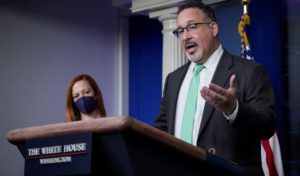
The Senate approves a $1.2 trillion infrastructure bill, the FDA allows a booster shot for vulnerable populations, and more…
IN THE NEWS
- In a 69-30 vote, the U.S. Senate approved a bill authorizing $1.2 trillion for infrastructure improvements. President Joseph R. Biden stated that the bill, in part, is intended to improve water systems, renewable energy infrastructure, and environmental remediation efforts as well as underscore the “climate crisis much more in our minds.” The bill would require that the U.S. Secretary of Transportation and the U.S. Environmental Protection Agency (EPA) create tools for states to assess carbon dioxide and greenhouse gas emissions on public roads. The bill would also require EPA to issue regulations barring the discharge of plastic from certain facilities and require that those applying for a wastewater infrastructure grant assess and mitigate any potential impacts of climate change on their wastewater infrastructure project. The bill still must pass the U.S. House of Representatives.
- The U.S. Food and Drug Administration (FDA) modified the emergency use authorizations for the Pfizer and Moderna COVID-19 vaccines to allow certain vulnerable populations to receive a booster shot. Rochelle Walensky, director of the Centers for Disease Control and Prevention (CDC), said that the additional shot would be available to people who are moderately and severely immunocompromised. In addition, the CDC updated its COVID-19 vaccination guidance to recommend that people who are pregnant, may become pregnant, or are breastfeeding be vaccinated to protect themselves against the virus. The CDC update followed the release of new data evidencing that there is no increased risk of miscarriage in individuals who receive a COVID-19 vaccination in the first 20 weeks of pregnancy. The CDC emphasized that unvaccinated individuals who are pregnant or postpartum, however, are at increased risk of becoming severely ill from COVID-19.
- President Biden issued an executive order directing the National Highway Traffic Safety Administration and EPA to tighten fuel efficiency standards for cars and trucks. The Biden Administration seeks to restore the Obama Administration’s fuel efficiency standards that had been reduced under the Trump Administration. The new standard called for by the executive order would require automakers’ new passenger cars to average 52 miles per gallon by 2026. The order also set 2030 as the target for having half of all new vehicles sold be zero-emission. The order received support from automakers, industry unions, and environmentalists.
- The U.S. Department of Education issued new legal guidance encouraging states to work together with the federal government on efforts to oversee federal student loan servicers. The Biden Administration’s new interpretation rescinded the prior interpretation from the Trump Administration, which had attempted to block state oversight efforts, issuing legal guidance asserting that state regulations such as disclosure requirements were preempted by federal law and that only the federal government could oversee federal student loan servicers.
- The U.S. Department of Defense will require members of the military to get the COVID-19 vaccine. U.S. Secretary of Defense Lloyd J. Austin III sought President Biden’s approval to make the vaccine mandatory for service members by mid-September, which President Biden immediately supported. Austin suggested that the deadline could come sooner depending on when FDA gives the vaccine final approval. In a message to service members, Austin explained that vaccination was important to maintaining the U.S. military’s readiness and lethality.
- A federal judge allowed Norwegian Cruise Line to continue to require its passengers to show proof of COVID-19 vaccinations before boarding ships in Florida. The order prevents state officials from enforcing a Florida law against the cruise line that would have fined businesses that require proof of vaccinations. The CEO of Norwegian Cruise Line, Frank J. Del Rio, said that the ruling will allow the cruise line to resume operations in “the safest and most prudent way.” Florida Governor Ron DeSantis reportedly stated that he will appeal the judge’s decision.
- U.S. Secretary of Education Miguel Cardona reportedly stated at a press event that he was in favor of mandating COVID-19 vaccines for educators, noting that the consideration for mandating vaccines for educators would grow stronger with FDA approval of the vaccines. Cardona’s comments on mandated vaccines for educators came as the state of California became the first state to announce a new public health order mandating proof of vaccination or weekly testing for staff in K-12 schools. Randi Weingarten, president of the American Federation of Teachers, signaled that the union could become more supportive of vaccine mandates and is rethinking its position that vaccines should be voluntary.
WHAT WE’RE READING THIS WEEK
- In a report for the Intergovernmental Panel on Climate Change—the United Nations body created to assess “the science related to climate change”—a working group presented findings on the role of human influence on the current state of the climate and potential climate futures. In its summary for policymakers, the working group confirmed the relationship between carbon dioxide emissions and global warming, noting that limiting human-induced global warming would require “at least net zero” carbon dioxide emissions. The report’s authors forecasted, however, that the global surface temperature would continue to rise under all emissions scenarios considered by the researchers, which will lead to continued climate extremes and adverse events such as heatwaves, droughts, and tropical cyclones.
- In a recent National Bureau of Economic Research working paper, Joshua S. Gans, professor at the University of Toronto’s Rotman School of Management, studied the impact of different policy interventions on COVID-19 vaccine hesitancy. Gans found that the prevalence of the virus drives vaccination and that vaccine passports may be an ineffective tactic for improving vaccination rates. Gans explained that even though vaccine passports may reduce the prevalence of the virus, the passports have little impact on vaccine hesitancy because the reduced prevalence of the virus leads people to view the vaccine as less necessary.
- In a Brookings Institution report, Faine Greenwood argued that states and cities should contemplate stricter regulations for drones used by police departments. After the Federal Aviation Administration began allowing open air drone use in 2016, Greenwood noted that states began implementing a patchwork of drone regulations. For instance, Greenwood explained that some states have required warrants for police drone use, while other states have required that police disclose how they are using drones and the purpose behind the drone use. Without a federal regulatory framework, Greenwood argued that states and cities should implement regulations about access to drone data and regulations should outline clear penalties if police misuse drone data.
FLASHBACK FRIDAY
- In an essay in The Regulatory Review, Ethan N. Elkind, director of the Climate Program at the Center for Law, Energy, and the Environment at the University of California Berkeley Law School, characterized changes made to fuel economy regulations under former President Donald J. Trump—which reduced fuel economy improvement requirements from four to five percent per year to about two percent per year—as detrimental to the United States’ position as an environmental leader. Elkin explained that this reduction would result in the fuel economy of the United States falling behind that of the European Union and China. Elkin elaborated that the reduction would negate states’ efforts to mandate more stringent fuel economy policies in-state. Elkin argued that the federal government must enact more limiting fuel emissions policies to remain competitive on the global environmental stage and to combat climate change.



